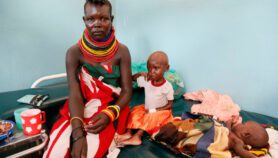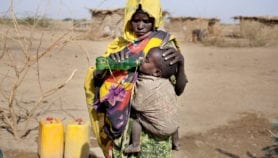Send to a friend
The details you provide on this page will not be used to send unsolicited email, and will not be sold to a 3rd party. See privacy policy.
Amir Attaran claims in an article in PLoS Medicine today (13 September) that the Millennium Development Goals (MDGs) created in 2000 to tackle poverty, hunger and disease in the developing world might become a liability and are doomed to fail (see Progress on UN development goals ‘can’t be measured’).
Although Attaran raises important points on the poor quality of data for some indicators used to measure progress on the MDGs, he uses these findings to draw the wrong conclusions.
Of course the data on the world’s poorest people are weak, as is just about every other effort regarding the poor. Rich countries invest little in helping save the poor from dying of malaria and tuberculosis. It is therefore no surprise that developing countries and the international system lack the resources to measure the diseases’ effects well. Attaran’s criticisms in this regard are justified, and have been made by many others before him, including many professionals working for the UN system.
The world leaders who attended the 2000 Millennium Summit committed to halve poverty in its many forms by 2015, and the MDGs are the result of that political commitment. Attaran ignores that broad goals adopted by world leaders are distinct from the technical question of how to define and measure progress toward those goals.
The UN organisations were asked to help answer the technical questions. It is therefore inaccurate to blame them for setting goals that are difficult to measure. Goal setting is the prerogative of world leaders, and they have correctly reaffirmed their commitment to the MDGs many times since 2000.
Reviewing progress
In response, the UN has set up a process to review indicators and data on progress towards achieving the MDGs. This process involves many UN organisations as well as the Organisation for Economic Cooperation and Development, the World Bank and the International Monetary Fund. In recent years, this process has revised several MDG indicators and issued guidance on how to improve data collection.
Attaran’s assertion that the UN "shows a profound disrespect for the scientific process" is wrong and misleading. The UN leadership has rightly decided that heads of state and government should use tomorrow’s (14 September) world summit to focus on the high-level political decisions needed to strengthen the international framework for security, development and human rights.
On the development side, the summit’s greatest priority is to cement the MDGs as operational rather than simply rhetorical targets. The world leaders will not delve into the technical issues of measurement and indicators. UN statisticians and independent experts will continue to address this important work. Independent experts have been scrutinising the definition and measurement of these indicators for some time — as did, for example, several of the UN Millennium Project Task Forces.
Attaran’s paper incorrectly generalises across the MDGs. It describes some of the toughest measurement challenges (e.g. maternal mortality and malaria), and uses them to paint all the goals with the same brush. In addition to the example of child mortality rates cited in the paper, several other MDG indicators can be measured quite well. These include measures of malnutrition, primary school enrolment, gender equality in education, and access to basic infrastructure services.
Attaran’s article implies that there should be no goals when measurement is imperfect, as is the case in many countries with indicators for maternal mortality rates. Should world leaders therefore not set time-bound goals for reducing maternal mortality?
MDGs are not static
This would be a mistake for three reasons. First, even with incomplete or missing data, dramatic and verifiable improvements in women’s health can be achieved by investing in emergency obstetric care and other practical interventions to build and sustain primary health systems. The MDGs provide a major political and operational framework for doing this.
Second, the MDGs are already promoting stronger health systems in low-income settings. Those improved systems are key to ensuring the vital registrations that the author rightly recommends for improving the measurement of maternal death rates.
Third, the very adoption of the maternal mortality goal (and others) spurred organisations such the World Health Organisation, the Bill and Melinda Gates Foundation, and the World Bank to start looking at how to improve data collection. The MDGs are not a static, one-off process.
Attaran misleads the reader when he argues that the MDGs have become "all-encompassing" catch-alls for tenuously related interventions. To say that roads and electricity are falsely linked to achieving the goals is incorrect and suggests a lack of understanding of the integrated nature of development processes.
Unique framework
Roads and electricity play a critical role in reducing poverty, access to essential health services, reducing the number of mothers and children who die in or soon after childbirth, and a host of other channels directly related to achieving the MDGs. Therefore any strategy to achieve the MDGs needs to include these interventions as well. The UN Millennium Project described these linkages in the most detailed series of studies ever on practical approaches to achieving the MDGs (available online at www.unmillenniumproject.org).
We hope that Attaran’s key message on better data collection and interpretation is heard. More and better data on the conditions of the world’s poorest and most vulnerable people are certainly needed. However, even in countries with poor data systems, there is already enough information to start making the practical investments in education, health, basic infrastructure, and improved environmental management.
Crucially, the MDGs provide a unique framework for prompting the international cooperation that is needed to help poor countries escape the poverty trap, and to benchmark progress en route. No discussion about indicators and measurement — no matter how justified it is — should deflect from the overarching global commitment to the poorest of the poor that world leaders struck at the millennium summit in 2000 and will reconfirm at the world summit in 2005.
John McArthur (deputy director), Jeffrey D. Sachs (director), Guido Schmidt-Traub (associate director) are based at the UN Millennium Project, which was commissioned to recommend practical strategies for achieving the Millennium Development Goals.













